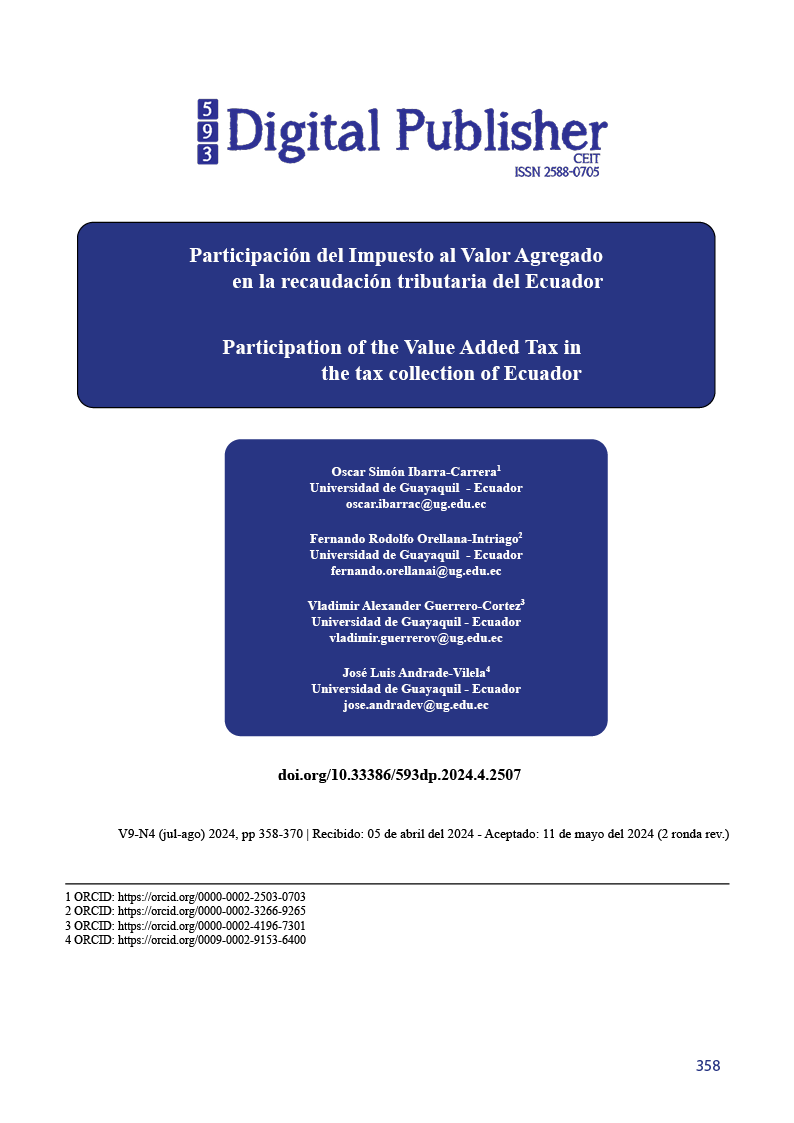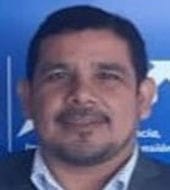Participation of the Value Added Tax in the tax collection of Ecuador
Main Article Content
Abstract
The purpose of the research is to analyze the participation of the Value Added Tax in Ecuador's tax collection, in the years 2019-2023. The variables that are selected allow comparisons to be made between the dependent variable and the independent variable, focused on establishing the level of dependence of tax collection on the value added tax (VAT). The type of research used is documentary with a descriptive scope, a sample is selected for convenience, the sample corresponds to the tax collection that Ecuador obtains in the years 2019 to 2023. The dependent variable represents the total tax collection, the independent variable is the value added tax (VAT). The study allows us to establish that the value added tax (VAT) is highly significant for the generation of income from taxes, on average it represents $7,099 million dollars, which corresponds to more than 50% of the total collection, the result explains the importance that It has VAT for the state when using it as a revenue generating mechanism. The factors that determine the reason why the value added tax is highly significant when it generates income for the state are: that it is an indirect tax that is levied on all people who carry out a commercial transaction, whether natural or legal; the tax culture promoted by the control authorities and the ease of payment due to the scope of application of the tax.
Downloads
Article Details

This work is licensed under a Creative Commons Attribution-NonCommercial-ShareAlike 4.0 International License.
1. Derechos de autor
Las obras que se publican en 593 Digital Publisher CEIT están sujetas a los siguientes términos:
1.1. 593 Digital Publisher CEIT, conserva los derechos patrimoniales (copyright) de las obras publicadas, favorece y permite la reutilización de las mismas bajo la licencia Licencia Creative Commons 4.0 de Reconocimiento-NoComercial-CompartirIgual 4.0, por lo cual se pueden copiar, usar, difundir, transmitir y exponer públicamente, siempre que:
1.1.a. Se cite la autoría y fuente original de su publicación (revista, editorial, URL).
1.1.b. No se usen para fines comerciales u onerosos.
1.1.c. Se mencione la existencia y especificaciones de esta licencia de uso.
References
Asamblea Nacional del Ecuador. (2018). Código Tributario Ecuatoriano. www.lexis.com.ec
Briones, J. C. M., Hidalgo, G. F. J., Valverde, M. Sc. D. G. A., & Izquierdo, M. S. G. R. A. (2022). Brecha de veracidad del aumento del Impuesto al Valor Agregado (IVA) del 12% al 14%, período junio 2016 a mayo 2017. Ciencia Latina Revista Científica Multidisciplinar, 6(4), 3071–3084. https://doi.org/10.37811/CL_RCM.V6I4.2813
Bunq. (2024). Lo que necesitas saber sobre el impuesto al valor agregado | bunq. Https://Www.Bunq.Com/Es-Es/Blog/What-You-Need-to-Know-about-Value-Added-Tax. https://www.bunq.com/es-es/blog/what-you-need-to-know-about-value-added-tax
Cacay, J. C. C., Chávez, G. D. R., & Vásquez, J. A. C. (2021). Efecto del Crecimiento Económico y la Presión Fiscal sobre el Impuesto al Valor Agregado. Revista San Gregorio, 1(47). https://doi.org/10.36097/rsan.v1i47.1750
Carmen del Rocío López Martínez. (2010). UNIVERSIDAD ANDINA SIMÓN BOLÍVAR SEDE ECUADOR AREA DE DERECHO PROGRAMA DE MAESTRIA EN TRIBUTACIÓN. https://repositorio.uasb.edu.ec/bitstream/10644/2243/1/T-0851-MT-L%c3%b3pez-Analisis%20de%20la%20incidencia.pdf
Facturas rápidas FREC. (2024). ¿Qué es el IVA? Impuesto al Valor Agregado (IVA) - facturas rápidas ec frec. Https://Facturasrapidasec.Com/Que-Es-El-Iva/. https://facturasrapidasec.com/que-es-el-iva/
Fidias. (2012). El Proyecto de Investigación Introducción a la metodología científica (Editorial Episteme).
Gallardo-Echenique, E. (2017). Metodología de la Investigación: manual autoformativo interactivo. In Universidad Continental. Universidad Continental. http://www.continental.edu.pe/
Gil-Espinoza, D. J., Camacho-Villota, W. A., Laje-Montoya, J. S., & Suarez-López, S. C. (2022). El Impuesto al Valor Agregado: tasas vigentes en Sudamérica. Revista Científica FIPCAEC (Fomento de La Investigación y Publicación Científico-Técnica Multidisciplinaria). ISSN: 2588-090X. Polo de Capacitación, Investigación y Publicación (POCAIP), 7(1), 492–505. https://doi.org/10.23857/fipcaec.v7i1.533
Hernández. (2010). Metodología de la investigación, 5ta Ed. www.FreeLibros.com
Julieta Arias Urvina, D. (2008). FACULTAD LATINOAMERICANA DE CIENCIAS SOCIALES SEDE ECUADOR PROGRAMA ECONOMÍA CONVOCATORIA. www.flacsoandes.edu.ec
Lima, L. V. de A., Martis, O. S., Machado, M. R., Lima, L. V. de A., Martis, O. S., & Machado, M. R. (2020). Relación entre el impuesto sobre el valor agregado y el crecimiento de las empresas. Contaduría y Administración, 65(3). https://doi.org/10.22201/FCA.24488410E.2020.2383
Moncayo, P. (2023). El Impuesto al Valor Agregado en servicios prestados a través de plataformas digitales operativas en el Ecuador. https://repositorio.uasb.edu.ec/bitstream/10644/9531/1/T4175-MDT-Moncayo-El%20impuesto.pdf
Muñoz Yánez, T. G. (2020). UNIVERSIDAD TÉCNICA DE AMBATO FACULTAD DE CONTABILIDAD YAUDITORÍA CARRERA DE CONTABILIDAD Y AUDITORÍA Proyecto de Investigación, previo a la obtención de Título de Ingeniera en. https://repositorio.uta.edu.ec/handle/123456789/33932
Nelson Asencio Cristóbal1, M. P., M. T. C. L. A. C. (2016). LAS REFORMAS AL IMPUESTO AL VALOR AGREGADO Y SU EFECTO EN LA ECONOMÍA DEL CONSUMIDOR EN LA PROVINCIA DE SANTA ELENA. AÑO 2016. Https://Repositorio.Upse.Edu.Ec/Bitstream/46000/7679/1/UPSE-RCT-2017-Vol.4-No.1-017.Pdf. https://repositorio.upse.edu.ec/bitstream/46000/7679/1/UPSE-RCT-2017-Vol.4-No.1-017.pdf
Norma Viviana Benavides Toapanta. (2019). UNIVERSIDAD CENTRAL DEL ECUADOR FACULTAD DE CIENCIAS ADMINISTRATIVAS DIRECCIÓN DE POSGRADO “Análisis de la recaudación del impuesto al valor agregado (IVA), en los años fiscales 2015, 2016 y 2017, en el Ecuador.” Https://Www.Dspace.Uce.Edu.Ec/Entities/Publication/71900747-Abfa-4aef-B798-Edebd0b6f99b. http://www.dspace.uce.edu.ec/handle/25000/21070
Presidencia de la Republica del Ecuador. (2023). Ecuador se ubica entre los países de Latinoamérica que cobran menos IVA. Https://Www.Presidencia.Gob.Ec/Ecuador-Se-Ubica-Entre-Los-Paises-de-Latinoamerica-Que-Cobran-Menos-Iva/. https://www.presidencia.gob.ec/ecuador-se-ubica-entre-los-paises-de-latinoamerica-que-cobran-menos-iva/





